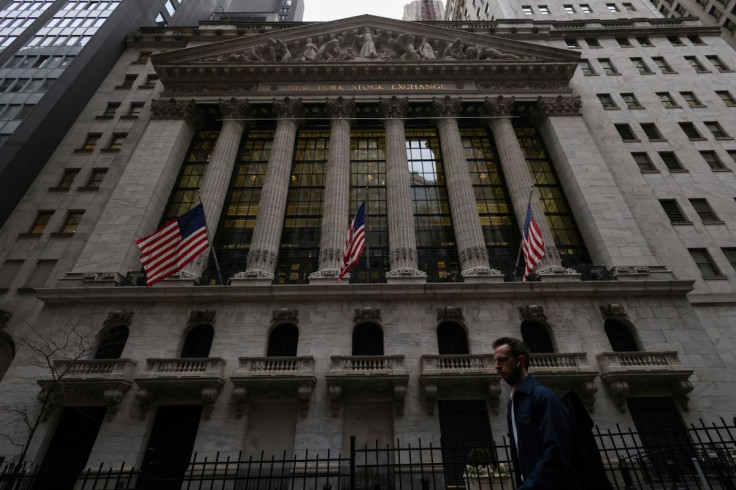Wall Street Slumps As Spiraling Inflation Cements Rate Hike Bets

The tech-heavy Nasdaq fell nearly 2% on Thursday as U.S. inflation rose to a four-decade high in February, cementing the chances of the Federal Reserve raising interest rate later this month.
Monthly consumer prices rose 7.9% in February from a year earlier, the Labor Department data showed, matching economists' expectations.
Investors fear it would accelerate further in the coming months as Russia's war against Ukraine drives up the costs of oil and other commodities.
"Between wages and energy prices this inflation has been pushing much higher. It just confirmed for everyone that inflation is stubbornly high," said Mike Skillman, chief executive officer of Faith Investor Services.
Fed Chair Jerome Powell had said he would back a quarter point rate increase when the central bank meets next week and would be "prepared to move more aggressively" later, if inflation does not abate as fast as expected.
Ten of the 11 major S&P sectors declined. Technology stocks, which had led a rally in the previous session, led the losses with a 2.9% decline.
Chipmakers slid 3.4%, while megacap names Apple Inc and Tesla Inc slumped 3.4% and 4.2%, respectively.
A rise in U.S. 10-year Treasury yield to near 2% also hit rate-sensitive tech stocks as their value rests heavily on future earnings, which are discounted more deeply when rates go up. [US/]
The S&P 500 growth index has lost 16.7% so far this year compared to a 5.7% decline in its value counterpart, which was supported by a surge in energy shares.
Energy shares climbed 2.4% after taking a breather on Wednesday. [O/R]
Meanwhile, traders now expect a 95% chance of a 25-basis point hike by the Fed in its March meeting. [IRPR]
Big banks fell, with Citigroup dropping 2.8%. Goldman Sachs Group Inc said it was closing operations in Russia, becoming the first major Wall Street bank to exit the country following Moscow's invasion of Ukraine.
Ukraine said Moscow had ignored its plea for humanitarian access, as the opposing sides yielded nothing at the highest level talks since the Russian invasion began.
"The stock market is going to remain very volatile based on the day-to-day news coming out of Ukraine, potentially any further sanctions that the U.S. and the NATO allies impose upon Russia and the reaction from Putin," said Jimmy Lee, chief executive officer of the Wealth Consulting Group.
At 11:57 a.m. ET, the Dow Jones Industrial Average was down 392.16 points, or 1.18%, at 32,894.09, the S&P 500 was down 56.90 points, or 1.33%, at 4,220.98, and the Nasdaq Composite was down 261.13 points, or 1.97%, at 12,994.42.
Shares of Amazon.com Inc jumped 5.2% after its board approved a 20-for-1 split of the e-commerce giant's common stock and authorized a $10 billion buyback plan.
Declining issues outnumbered advancers for a 3.20-to-1 ratio on the NYSE and for a 3.38-to-1 ratio on the Nasdaq.
The S&P index recorded two new 52-week highs and 10 new lows, while the Nasdaq recorded 19 new highs and 132 new lows.
© Copyright Thomson Reuters 2024. All rights reserved.




















